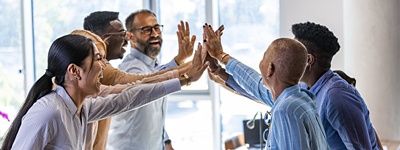我们一个ll like learning, and at Workday we believeinvesting in skillsis a great way to help our employees succeed and feel motivated. One of the ways we’re doing this is by offering gigs, or short-term assignments, throughWorkday Talent Marketplace, which enables Workmates to learn new skills by signing up to work on a project with a different team. We think programs like this are energizing for employees and add more value to the organization in the process.
我们一个lso know that a skills-based people strategy is essential when it comes to hiring new talent. Identifying the most important skills for a role instead of just relying on degrees or previous job titles expands pathways for candidates and opens up new talent pools.
There have been countless shifts during the pandemic, including a shift in the actions to advance belonging and diversity (B&D). What is Workday doing in this area?
The pandemic prompted many organizations to toss their operating models out the window—with many saying “to heck with that!” And an overdue outcome of this was a renewed focus on B&D. Since we were talking about skills, a key benefit of a skills-based people strategy is that it creates more opportunities for candidates from underserved communities or nontraditional backgrounds, where there is an abundance of untapped talent.
A skills-based approach drives B&D and, in the absence of that, we’re cutting off valuable avenues to talent. Another way to expand talent pools and drive B&D is by expanding in key locations, which is one of the approaches Workday is taking by increasing our investments in specific regions globally.
B&D is also important as it relates to role models. I valued having a young female leader early in my career, and at Workday we think it’s important for everyone to see themselves represented in leadership. That’s why in the U.S., increasing Black and Latinx representation overall and specifically in leadership roles is a primary focus of ourcompany commitmentsrooted in VIBE™(Value Inclusion, Belonging, and Equity), which is our unique approach to B&D. We’re also passionate about building inclusive products and technologies, and in that spirit we launchedVIBE solutionsto help other organizations advance their B&D efforts.
Your lesson about the importance of helping those on the front lines must have been invaluable over the last couple years. How has Workday shown up for front-line workers?
First, I have to express an enormous amount of gratitude for the healthcare and front-line workers who have been at the forefront of the pandemic since day one. In terms of how we’ve shown up at Workday, employees are our number onecore value—if you have happy and healthy employees they’re able to focus on supporting our customers—and we can talk more about that in a moment.
It’s an honor to support our customers and their front-line workers through these challenging times, and we’re doing that in a number of ways. From making it easier tomanage schedulesto logging into workstraight from a phoneorstreamlining health and safety measuresin the workplace, we're putting a strong focus on supporting the front-line worker with our technology as part of ourReturn to Workplaceofferings.
我们一个lso made severaldonationsto organizations on the front lines and enabled Workmates to support their communities through a donation-matching program.
And for Workmates—how have you supported them through this changing environment?
我们经历了深刻的东西,虽然h there are a lot of reasons to be optimistic, we’re still going through it. We believe deeply in our employee-first culture, and we try extremely hard to live that. The first step is making sure every Workmate is heard. A key pillar of employee experience at Workday is Feedback Fridays, where we leverageWorkday Peakon Employee Voiceto keep a pulse on employee sentiment every week. We receive millions of data points from this that help us take action and adjust our programs as needed.









